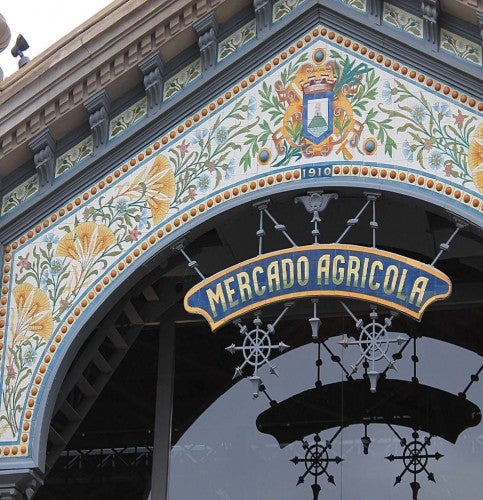By Verónica Adler and Ana Castillo*
The Municipal Government bet on renovating the iconic Agricultural Market in the Goes neighborhood, and in the first trimester of 2014 the restored landmark generated 550 jobs and had a turnover of $US8.8 million.

The good old days
Carmen and Carlos are a married couple in Montevideo, who have been residents of the Goes neighborhood for more than four decades. It was in Goes that they met at a neighborhood club, then married and raised their two children Juan and Silvia, who today are university graduates and professionals like many children of the middle class.
Goes was founded in 1866 and is one of the most emblematic areas of the city, with a wide variety of services, institutions and facilities. The historic convergence of immigrants of diverse origins has given it a rich cultural heritage.
Goes has a unique flavor. The historic neighborhood brings together residential housing, as well as basic industries and shops employing more than 2600 people. In 1886, a large fruit and vegetable market was built in Goes and called the Agricultural Market of Montevideo. It was an exemplary building, a donation from the Belgian government, which for decades injected money into the neighborhood and into Montevideo as a whole.
The crisis of the eighties and nineties, together with the expansion of the outlying areas of the city, so common in much of Latin America, caused the area to be emptied out little by little.
The gradual loss of inhabitants and jobs, of services and businesses, sapped the neighborhood of its economic energy. The sustained deterioration of daily life converted Goes into a slum-like area, unsafe and broken down, with the resulting diminishment of its cultural and social heritage.
The Agricultural Market lost its splendor. A significant portion of its merchants withdrew, and those that remained began to suffer from the insecurity of the area and a significant reduction in sales. The building was in ruins with serious problems in its roof and structure. Little by little, the neighborhood in the heart of Montevideo shed its role as a place of social and cultural integration and ended up as if a marginal, outlying district.
Life also changed for Carmen and Carlos. They went from living in an area of Montevideo with a wide range of social classes and the connected life of a neighborhood to one with a stock of deteriorating houses, a slow but steady drop in the number of businesses, and the growing presence of individuals linked to drug dealing and organized crime. Eventually, their children left the neighborhood to raise their own children in other areas of the city.
A bet that paid off
In 2007, the Municipal Government, with the collaboration of the Inter-American Development Bank (IDB) and the Multilateral Investment Fund (MIF), proposed reviving the neighborhood and converting it again into a safe and peaceful space where people could live and work as in old times.
The recuperation of the Agricultural Market began as a flagship project to revive surrounding public spaces and increase local urban facilities (day care center, parking area, plazas and citizen help centers). An urban improvement fund was established, new housing solutions were devised, and community initiatives were born. (Video available in Spanish only)
The restoration project for the Agricultural Market included not only the recovery of the site’s cultural heritage, but also the inauguration of a new business model, adapted to the patterns of current shopping. The merchants of the sector received technical assistance to help them adapt to that model.
“Goes” shines again
Today, not only Carmen and Carlos, but also the people of Montevideo as a whole enjoy a meeting place in which they can buy fresh products and savor a large variety of gastronomic and cultural activities. Carmen and Carlos’s son Juan just announced that he and his partner are looking for a place to rent so they can move back to the neighborhood (Video available in Spanish only).
The results are everywhere to be seen. Private investment appeared after the intervention by the public sector. Private developers and cooperatives refurbished several buildings, and there is a new supply of housing occupied principally by young people. The neighborhood, meanwhile, has become ever more dynamic: since its inauguration, the market alone has received more than 260,000 visitors per month and generated 550 direct jobs, with a turnover of $US8.8 million in the first trimester of 2014.
The residents of Montevideo are happy, the merchants of the Market content, and those who were involved in the revitalization of the neighborhood are celebrating because they have proved that betting on the recuperation of urban areas is an excellent bet after all.
_________________
This post is part of a blog series on development effectiveness featuring stories on learning and experiences from IDB projects and evaluations. To learn more about design, monitoring and evaluation of IDB projects visit deo.iadb.org.
*Veronica Adler is a Senior Specialist at the Inter-American Development Bank. She holds a bachelor´s degree in Economics and an M.A. in Public Policy from Argentina’s Universidad Torcuato Di Tella.
Ana Castillo is a Senior Specialist from the Multilateral Investment Fund, MIF, in Uruguay since 2006. Ana’s work focuses on the identification, design and supervision of operations, and activities related to knowledge management.


Leave a Reply